In this section, the CGSW highlights our the previous years’ WASH seminars and events. The CGSW Seminar Series is designed to showcase the research and programmatic work of our extensive network of faculty and partners in WASH. CGSW also acknowledges World Water Day, Global Handwashing Day and World Toilet Day with student-initiated learning activities and other special presentations. The videos below are a collection of WASH presentations and events that have occurred at Rollins School of Public Health from 2015-present (2019). Note: Some lectures are not available for viewing due to privacy or embargoed information

Safe to Drink: How Drinking Water in the US can be Hazardous to Your Health
Christopher Sistrunk, Ph.D, Assistant Professor, Population Services, City of Hope, Beckman Research Institute
This presentation gives a glimpse into how drinking water deemed safe to drink by the US EPA, may actually lead to chronic illnesses through changes in epigenetics.
 Keeping Watch Over the Chattahoochee River: Law, Policy, and Politics II – The Verdict
Keeping Watch Over the Chattahoochee River: Law, Policy, and Politics II – The Verdict
Dr. Christopher J. Manganiello, Water Policy Director & Jessica Sterling, Technical Programs Director
Over 5 million people depend on the Chattahoochee River basin’s water for drinking, wastewater assimilation, energy generation, agricultural production, and recreation. Chattahoochee Riverkeeper’s Jess Sterling (Technical Programs Director) and Chris Manganiello (Water Policy Director) discuss how water quality and water supply policies affect the Chattahoochee River. Come hear how the federal Clean Water Act protects the river and about the status of the transboundary “water wars” involving Florida and Alabama.
 Social Impact + The Sanitation Sector
Social Impact + The Sanitation Sector
Jasmine Burton, Founder and President, Wish for WASH, LLC
Jasmine Burton graduated with Highest Honors from the Georgia Institute of Technology’s (GT) School of Design with a Bachelor’s of Science in Industrial/Product Design. Prior to graduation, Burton founded Wish for WASH, LLC, a social impact startup intended to bring innovation to sanitation after her senior design team was the first all-female team to win the GT InVenture Prize Competition for their invention of the SafiChoo toilet in 2014. Burton led Wish for WASH in conducting iterative toilet innovation pilots and research in Kenya, Zambia, Uganda, Ethiopia and in an Atlanta-based resettled refugee community all with a human-centered design and research lens. Burton continued to pursue her passion for hygienic, equitable, and sustainable sanitation as a 2016-2017 Rotary Global Grant Scholar and MSc in Public Health graduate student at the London School of Hygiene and Tropical Medicine while representing Wish for WASH in a number of media outlets including CNN Money, Inc., WIRED, Fast Company, WSBTV and TEDxAtlanta. With 5 years of sanitation experience in the research, health communications, and social enterprise spaces, Burton identifies as a social impact designer and storyteller who seeks to utilize design thinking and business acumen to accelerate universal access to improved sanitation.
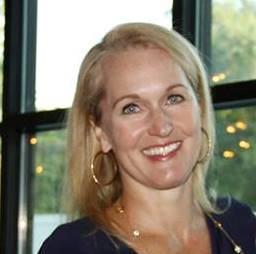
Systems and Sustainable Services
Susan Davis, Global Coordinator, Agenda for Change; Founder and Executive Director, Improve International
Community-focused water projects continue to lead to disappointing results for decades. What happens when something breaks? What happens when that latrine fills up? Who makes sure the water is safe, or the fecal sludge is treated and disposed of correctly? Most communities cannot maintain safe, reliable water or sanitation services without support from local government and the private sector. That’s where the systems strengthening approach comes in
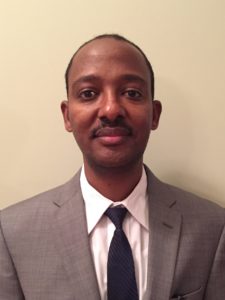 Watershed level impact of septic systems on water quality in Metro Atlanta
Watershed level impact of septic systems on water quality in Metro Atlanta
Mussie Habteselassie, Associate Professor, Crop and Soil Sciences, Soil Microbiology, UGA College of Agricultural and Environmental Sciences
Septic systems are widely used in the southeast but their impact on water quality is not well understood to allow for their proper management at watershed level. This study investigated the impact of septic systems on water quality of streams in watersheds of metropolitan Atlanta in collaboration with the South Atlantic Water Science Center of United States Geological Survey. The impact of septic systems was isolated using multiple approaches that included targeted monitoring of fecal indicator bacteria and microbial source tracking markers as well as watershed scale modeling with the Soil and Water Assessment Tool. Twenty-four urbanizing watersheds impacted by a gradient of septic system density and land use characteristics were monitored for three years. Results indicated that density of septic systems and the proximity of septic systems to streams were significant drivers of fecal pollution in the watersheds. Moreover, the influence of septic systems was seasonally dependent.
 Drinking water quality, food insecurity, and health outcomes in a cohort of infants and mothers residing in a community affected by El Niño flooding: Piura, Peru, 2015-2017
Drinking water quality, food insecurity, and health outcomes in a cohort of infants and mothers residing in a community affected by El Niño flooding: Piura, Peru, 2015-2017
View presentation
Carlos Culquichicon, MD, Emerge Piura, The Emerging Diseases and Climate Change Research Unit, Universidad Nacional de Piura / Miranda Delahoy, PhD, Environmental Health Sciences, Rollins School of Public Health
Carlos Culquichicón, M.D., is a global health epidemiologist leading Emerge Piura, the Emerging Diseases and Climate Change Research Unit at the Universidad Nacional de Piura, which is the satellite unit of Emerge at the Universidad Peruana Cayetano Heredia. Dr. Culquichicón’s research is focused to understand the El Niño impacts on health including infant nutritional status, mental health, and transmission patterns of arboviral outbreaks. Miranda Delahoy recently completed her PhD in Environmental Health Sciences at Rollins. Her dissertation was entitled “Challenges in Reducing the Burden of Childhood Diarrhea in Peru” and addressed several factors associated with diarrheal disease in Peru, including rotavirus vaccination, climate change, El Niño events, sanitation, and water quality and access.
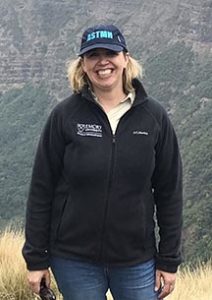
Investigating Novel Drivers of Leprosy Transmission: Where Do Unsafe Water, Sanitation and Hygiene Fit?
Jessica Fairley, MD, MPH, Associate Professor of Medicine, Division of Infectious Diseases, Emory School of Medicine, Rollins School of Public Health
Leprosy remains under recognized as a cause of significant morbidity in many regions of the world and incidence rates have not appreciably declined in well over a decade. Overwhelmingly, leprosy affects areas with low resources and high rates of poverty. Studies identifying the contribution of poverty-related factors to leprosy transmission such as neglected tropical diseases (NTDs) and unsafe WASH are lacking within the global leprosy research arena, stalling progress towards leprosy elimination. Our work in Ethiopia and Brazil investigates novel drivers of leprosy transmission such as parasitic co-infections that may influence the infectiousness of leprosy and unsafe WASH factors that may harbor viable Mycobacterium leprae. The goal is a multidisciplinary approach to leprosy control that may lead to strategies to effectively reduce transmission in highly endemic areas.
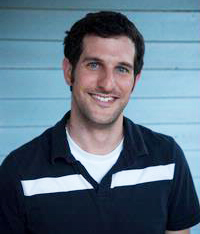
Water, sanitation and hygiene for the control of neglected tropical diseases: recent evidence and emerging approaches
Matthew Freeman, PhD, MPH, Associate Professor, Department of Environmental Health, Rollins School of Public Health
The World Health Organization has identified improvements to water, sanitation and hygiene (WASH) as critical for control and elimination of several of the so-called neglected tropical diseases, including trachoma, soil-transmitted helminths (STH), and schistosomiasis. There is ample observational evidence suggesting an impact of WASH on NTDs, but rigorous trials and effective interventions are lacking. These NTDs have been primarily addressed through preventive, population-based drug delivery. There is a need to not only understand the impact of WASH on NTDs, but to develop and evaluate effective interventions. Dr Freeman discussed recent evidence and emergent approaches to integrate WASH and NTD programming.
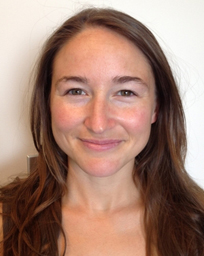
Beyond Construction: Theoretically-Informed Behavior Change Intervention Design for Increasing Latrine Use in Rural India
Presentation not available for viewing
Bethany Caruso, PhD, MPH, Department of Environmental Health, Rollins School of Public Health
Water, sanitation and hygiene (WASH) have important impacts on health and well-being. However, impacts may be limited if appropriate behaviors are either not sustained or practiced. In the WASH sector, there has been a consistent push for the development and delivery of technologies, like water filters, toilets, and handwashing facilities, with less effort and emphasis on the design and delivery of contextually appropriate interventions to change and sustain behavior. In India, for example, an ongoing, multi-billion dollar national campaign is ongoing to increase latrine coverage. Comparatively little effort and money has been used to understand barriers to use by all family members and encourage latrine use by all, which is low and inconsistent even among latrine owning households. In this talk, Dr. Caruso discussed the process, including mixed-methods approaches and application of behavioral theory, to develop and test an intervention designed to increase latrine use in rural, Odisha India.

Keeping Watch Over the Chattahoochee River: Law, Policy, and Politics
Dr. Christopher J. Manganiello, Water Policy Director & Jessica Sterling, Technical Programs Director
Over 4 million people depend on the Chattahoochee River basin’s water for drinking, wastewater assimilation, energy generation, agricultural production, and recreation. Chattahoochee Riverkeeper’s Jess Sterling (Technical Programs Director) and Chris Manganiello (Water Policy Director) will discuss how water quality and water supply policies affect the Chattahoochee River. Hear how the federal Clean Water Act protects the river and about the status of the transboundary “water wars” involving Florida and Alabama
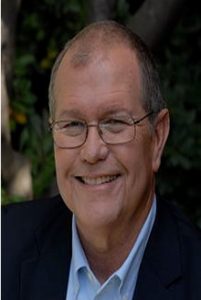
When Drinking Water Became Safer: The Chlorine Revolution Public Health Webinar
Dr. Michael J. McGuire, National Academy of Engineering
The Chlorine Chemistry Division of the American Chemistry Council is pleased to announce and support a series of public health webinars by Dr. Michael J. McGuire, a member of the National Academy of Engineering and the award-winning author of The Chlorine Revolution: Water Disinfection and the Fight to Save Lives. Published by the American Water Works Association (AWWA), Dr. McGuire’s book details the events leading to the first continuous use of chlorine (at less than one part per million), which, in conjunction with water filtration, revolutionized the treatment of drinking water in the United States. It also highlights the courage and perseverance of a still largely unknown New Jersey physician whose tireless efforts to improve public health changed world.
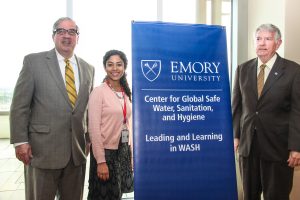
World Water Day 2018 – Water Challenges in Puerto Rico: Before and Beyond Hurricane Maria
Carl A. Soderberg, P.E. , – Graduate of Georgia Tech and a licensed engineer in Puerto Rico who has spent 48 yrs. In the environmental protection field, including 20 years as Director of the E.P.A. Caribbean Division and 16 yrs. In the Puerto Rico Environmental uality Board. Mr. Soderberg discussed the water resources issues in Puerto Rico, including fresh water availability, assimilation capacity of rivers and streams, water hyacinths and many more characteristics of the water in Puerto Rico before and after Hurricane Maria
Juan Villeta-Trigo, Ph.D. (c) – Economist with forensic experience in courts. One of the founding members of the Puerto Rico Water and Health Institute at the School of Environmental Affairs of the Metropolitan University of Puerto Rico; and one of the founds and Past President of the Puerto Rico Economists Association. Mr. Villeta-Trigo presented the economic costs of the 2015 drought in Puerto Rico. He will address the scarcity of water, its challenges and opportunities.
Ashley Andújar, MHSA – CDC Health Communications Specialist was deployed to Puerto Rico after the emergency to develop and coordinate health communication messaging regarding waterborne disease risks in collaboration with the Puerto Rico Department of Health.
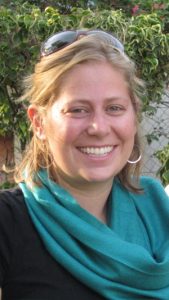
WASH and Women: What does female involvement in water and sanitation mean and why do we care?
Kelly Alexander, MPH, Senior Learning and Influencing Advisor for CARE’s Water+ team
Goal 5 of the SDGs is gender equality and women’s empowerment and 6 is clean water and sanitation. Involving women in water and sanitation programming is considered the best way forward for sustainable WASH. But many development partners (and governments) do not know how to execute this in practice. Kelly will discuss CARE’s gender framework and present findings from a recent policy assessment and community-level qualitative research in the Solomon Islands.
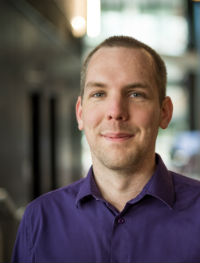
Using molecular approaches to determine the composition and function of microbial communities in different environments
Chris Greening, PhD ,Lecturer, Head, Integrative Microbiology Laboratory, Monash University
A tremendous abundance and diversity of microorganisms inhabit natural environments worldwide. While many of these microbes perform critical ecosystem services, such as nutrient cycling, a subset are pathogens that compromise public health. In recent years, the development of cultivation-independent molecular approaches has revolutionized our understanding of the composition and function of microbial communities, including in the public health field. In this seminar, I will give an overview of the techniques used to (i) extract nucleic acids from different environmental samples, (ii) determine the relative and absolute composition of their microbial communities, and (iii) explore and validate the function of specific community members. These approaches will be illustrated by examples from my work investigating the composition and metabolism of microbial communities in soil, marine, and gastrointestinal samples. The techniques and insights provided are relevant for ongoing studies investigating the environmental transmission pathways and survival mechanisms of pathogens.
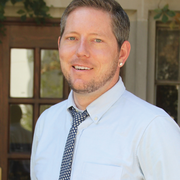
Nudges, Norms, and Enabling Technologies: New Approaches to Water, Sanitation, and Hygiene (WASH) Behavior Change.
Robert Driebelbis, PhD, MPH, Lecturer in Health and Hygiene, London School of Hygiene and Tropical Medicine
Improving water, sanitation, and hygiene (WASH) behaviors at the individual-and institutional-level remains a challenge in the health and development sectors. Traditional knowledge-based approaches to behavior change have resulted in limited improvements in practice. This presentation will focus on recent advances in our understanding of WASH behaviors and WASH behavior change, including recent advances in behavioral theory, the role of enabling and appropriate technologies is fostering sustained behavior change, and the application of “nudges” – environmental cues – to trigger intended behavioral outcomes.
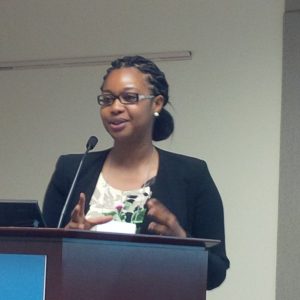
Designing a Monitoring, Evaluation and Learning System for a complex intervention in WASH: The case of a regional program in Latin America and Caribbean.
Lynda Olivia Rey, PhD, One Drop Foundation
Lynda Olivia Rey is leading a Monitoring, Evaluation, Learning and Knowledge Management Unit at the One Drop Foundation in Montreal, Canada. She is responsible for designing and implementing a comprehensive monitoring, evaluation, and learning system which enables continuous quality improvement and learning of Water, Sanitation, and Hygiene projects and programs in Central America, West Africa, and India.
She presented One Drop’s ABC for sustainability approach in WASH and the underpinning MEL system. She will also talk about challenges faced and opportunities related to the implementation of the MEL system in various contexts.
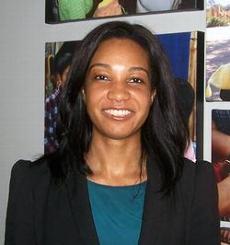 A Randomized Controlled Trial of a Hospital-Based Hand Washing with Soap and Water Treatment Intervention to Reduce Cholera (CHoB17)
A Randomized Controlled Trial of a Hospital-Based Hand Washing with Soap and Water Treatment Intervention to Reduce Cholera (CHoB17)
Christine Marie George, PhD, Department of International Health, Johns Hopkins School of Public Health
Household contacts of cholera patients are at a 100 times higher risk of developing a cholera infection than the general population. To initiate a standard of care for this high-risk population in Bangladesh, our research group developed the Cholera-Hospital-Based-Intervention-for-7-Days (CHoBI7), which promotes hand washing with soap and water treatment for the household contacts of cholera patients. In this seminar, the results of the randomized controlled trial of this intervention were presented.
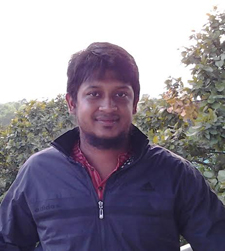
Impact of Drinking and Cooking Water Mineral Contents on Kidney Health and Implications on Future Cardiovascular Disease.
Presentation unavailable.
Naser Titu, PhD Candidate, Environmental Health, Rollins Schools of Pubic Health
Drinking water salinity has contributed to potable water scarcity and high sodium intake in southwest coastal Bangladesh. High prevalence of pre-eclampsia and high blood pressure has been associated with drinking water salinity in this region. Managed aquifer recharge, a hydrogeological intervention to reduce groundwater salinity, is currently being promoted in this region to solve the drinking water crisis. This project examines the health benefits and risks of drinking water from managed aquifer recharge.
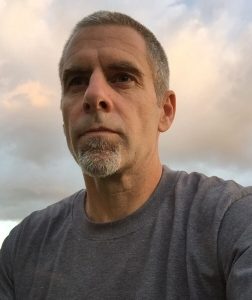
Sustaining Water Services: Challenges and Lessons from the Field
Paul Hicks, Water Resources Coordinator, Catholic Relief Services in Latin America
Paul has nearly 20 years of experience in water resources management and agricultural development. Paul started his career with the Peace Corps in Honduras, where he designed and built water systems with the national water agency. He worked for several years in California and the Pacific Northwest in natural resources, then studied at UC Davis where hear earned a Master’s degree in International Agricultural Development (1999). He has spent the last sixteen years with CRS working and living in Albania, Mindanao (Philippines), Afghanistan, and Central America. Paul has been in El Salvador since 2009, leading CRS’ programs related to water supply, watershed management, and water-smart agriculture. Paul’s expertise is focused on two themes: (1) protecting water sources through sustainable land management and (2) promoting local management of water systems
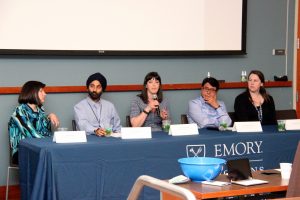
CGSW World Water Day 2016 – Flint Water: What Happens When Regulations Fail?
World Water Day is time for us to reflect and raise awareness about the global challenges of access to safe water for developing nations. As a community of scholars, we take this opportunity to educate our local Atlanta and Emory community and create dialogue around emerging and important issues in safe water that impact our world. This past year, we turned our attention to the water crises occurring in our own backyard – in Flint Michigan and other communities across America.
Using a series of short talks and a panel discussion, we explored the issues of water contamination in American drinking water supply through the lens of legal experts, public health scientists and medical practitioners. Our primary objective was to educate our audience and have an open dialogue regarding the intersection of water science, public health and US water policy. We also wanted to discuss the implications of various water contamination crises on our continued access to safe water in America – should we be worried?
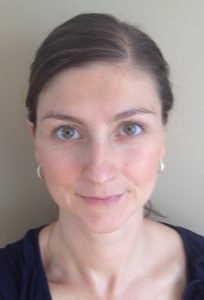
Estimating the Number of Cases of Acute Gastrointestinal Illness Attributable to Drinking Water in Canada (presentation unavailable)
Heather A. Murphy, Ph.D., Eng, Assistant Professor
College of Public Health, Division of Environmental Health, Temple University
Dr. Murphy has over twelve years of experience in water/ wastewater treatment, water quality, drinking water distribution, risk assessment and environmental health in both North America and abroad. Dr. Murphy obtained her PhD in Environmental Engineering from the University of Guelph, Canada, where she focused on appropriate household water treatment technologies in rural Cambodia. Following her PhD, she worked for the United Nations International Emergency Children’s Fund (UNICEF) as a Water, Sanitation and Hygiene Specialist in Mali and Madagascar. While in Mali, she coordinated a $25 million dollar Water, Sanitation and Hygiene (WASH) in Schools program, covering 1000 schools, the largest program of its kind in the world. She recently completed a research fellowship with the Public Health Agency of Canada where she focused on quantifying the burden of waterborne disease on the Canadian population. Prior to joining Temple in July of 2015, she was a research fellow at the University of Guelph where she conducted research on the challenges of water provision in Canadian First Nations communities. Dr. Murphy’s research interests involve understanding and addressing water and health challenges in both developed and developing countries
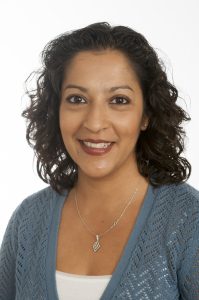
Extreme Precipitation and ER Visits for Gastrointestinal Illness in Areas with & without Combined Sewer Systems: An Analysis of Massachusetts Data, 2003-2007
Jyotsna S. Jagai, MS, MPH, PhD, Research Assistant Professor,
Environmental and Occupational Health Sciences
University of Illinois at Chicago
Jyotsna S. Jagai, MS, MPH, PhD is an environmental epidemiologist whose work focuses primarily on health impacts of water quality and environmental stressors of water quality including climate change and land use patterns. She is also interested in the development of comprehensive indicators to characterize the cumulative environmental impact on human health. Her work has focused on the adaptation of various methods for use in environmental epidemiology. Her methodological work includes time series analysis, meta-analysis methods, and development of environmental exposure measures. In this presentation, she will discuss her recent work on the impact of heavy rainfall in areas with and without combined sewer overflows
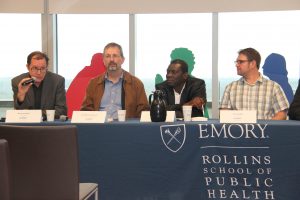
CGSW World Toilet Day, 2015 Lessons Learned in Sanitation
A lecture and panel discussion with visiting sanitation experts from SWA, WHO, Bill & Melinda Gates Foundation, USAID and World Bank moderated by Susan Davis from Improve International.
World Toilet Day is a day to take action for global sanitation! It is a day to raise awareness about all the people who do not have access to a toilet – despite the human right to water and sanitation.Of the world’s seven billion people, 2.4 billion people still do not have improved sanitation. One billion people still defecate in the open. Poor sanitation increases the risk of disease and malnutrition, especially for women and children.
For World Toilet Day 2015, Emory students participated in “Cop-A-Squat” for World Toilet Day awareness and then traced squatting images to place all around campus to raise awareness about issues around the practice of open defecation and the need for improved global sanitation.
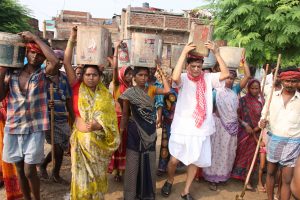
Innovation is the Key to Solving the Water and Sanitation Crisis in India
Dr. Bindeshwar Pathak, Founder, Sulabh International Social Service
Dr. Bindeshwar Pathak is the inventor of the two-pit compost flush technology that has helped provide low cost environmental toilets to millions of people in India. In 1970, he founded Sulabh International, one of India’s largest NGO working to promote human rights, environmental sanitation and waste management. The organization works in 25 Indian states, 1599 towns and has 50,000 volunteers. In 1974, he introduced the concept of building public toilets on “pay and use” basis, which are visible in most public places in India.
In 2014, he initiated a safe drinking water project in four districts in the West Bengal state in East India, where villagers are being provided clean drinking water at 50p per liter. A significant number of the villagers in these districts suffers from arsenic related diseases due to contamination of ground water. These treatment plants (installed with support from Sulabh) takes water from traditional ponds and rivers, which is arsenic free. The objective is to create a decentralized, people-friendly approach aimed at empowering communities by building capacity in them so that villagers, with training, can run the plant effectively.
Dr Pathak is a Padma Bhushan award recipient by the Indian government. He was inducted in the United Nations Environment Programme Global 500 Roll of Honour in 2003. He was awarded the Stockholm Water Prize in 2009 and received the Legend of Planet Award from the French Senate in 2013. His two-pit compost flush technology has been declared as a “Global Best Practice” by the United Nations HABITAT and United Nation’s Centre for Human Settlements.

Sustainable Groundwater Development in Africa: More than Engineering
Kerstin Danert, PhD, Rural Water Supply Network (RWSN)
Kerstin Danert is a rural water supply specialist focusing on developing in-country capacity with respect to operation and maintenance, cost-effective borehole drilling, technology adoption and sector performance monitoring. Her work has involved integrating institutional, socio-economic, cultural, political and technical aspects of rural water supply service provision in developing countries. She has provided face to face advisory and capacity development services to national and local governments, NGOs and the private sector in over 10 countries in sub-Saharan Africa as well as remote support for many more. She lived and worked in Uganda for ten years up to 2008, when she moved to Switzerland to join SKAT (Swiss Centre for Appropriate Technology). Since 2009, she has led the secretariat of the Rural Water Supply Network (RWSN).